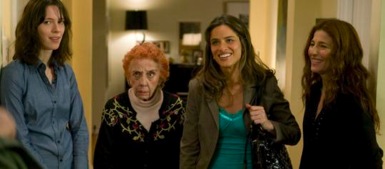Please Give

As an antidote to the opening of Sex and the City 2 on Thursday night, I went to see Nicole Holofcener's latest movie Please Give. The two movies have a lot in common: both are about women in New York City trying to make a living, find love, and get a pair of jeans that makes their butt look good (at least, you know, in concept.) But while all the lightness and sass of the first few seasons of "Sex and the City" have been sucked out of the movies, leaving what A.O. Scott describes as "the ugly smell of unexamined privilege", Please Give is a totally different story.
Catherine Keener is the star of every Nicole Holofcener movie, and she's always phenomenally great. Here she plays a woman uneasily living with the ugly smell of examined privilege. She and her husband Oliver Platt are waiting for the elderly woman next door to die so they can expand into her apartment, and they run a vintage furniture shop that relies on the willingness of children of dead people to part with their parents' beautiful old stuff so they can resell it with a huge markup.
Neither of these things are necessarily morally wrong, but she's so consumed with guilt that she tries to compensate in increasingly awkward ways: she gives twenties to people on the street, tries to gives leftovers to an older black man she incorrectly assumes is homeless, and offers to volunteer at a center for disabled kids, but is asked to leave when she starts crying while watching them play basketball. She's a really deeply flawed character and the source of most of her own misery. But the way Keener plays her, I felt like I could relate to her--after all, what thinking person doesn't feel some guilt about the poverty you see everyday in this city and want to do the right thing in response? The characters in this movie do the wrong thing a lot of the time, but they're so well written and acted that I still feel for them.
Oh, also, it's funny. The rest of the cast includes my girlfriend Rebecca Hall as a sweet, lonely mammogram technician who puts up with her nasty grandmother with a lot more patience than her sister, Amanda Peet. She plays a selfish bitchy pretty girl like she has in many movies, but this character is a lot more credible and sympathetic than her characters in Igby Goes Down or Saving Silverman. Representing the older and younger generations, there's the delightfully abrasive Ann Guilbert who plays the insufferable grandmother with genius comic timing, and Sarah Steele as Catherine Keener's teenage daughter who spends the whole movie mortified by her looks, until the last scene when she walks out of a dressing room wearing the coveted pair of flattering jeans absolutely glowing, and you realize she's a really good actress.
This movie could have easily been a repellently vapid story about neurotic upper middle class people and how hard it is to live a privileged life, but instead it's subtle, funny, and sometimes uncomfortably relatable. And it's so good to see a movie about women who are fully imagined people rather than plot devices. Roger Ebert's review is great: "Nicole Holofcener pays close attention to women. She doesn't define them by their relationships with men. In a Holofcener movie, women actually have their own reasons for doing things — and these are even allowed to be bad reasons, and funny ones. The movie is about imperfect characters in a difficult world, who mostly do the best they can under the circumstances, but not always. Do you realize what a revolutionary approach that is for a movie these days?"